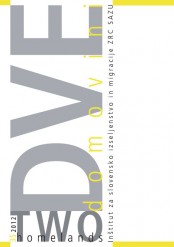Belonging, Membership and Mobility in Global History
Keywords:
migration, transnational, transcultural, globalization, Otherness, funds of knowledgeAbstract
Belonging and membership in societies depend on resources, societal structures, and stateside frames rather than on postulated and essentialized identities. Throughout the ages migrants have changed societies and affiliations; globalization emerged in the 1490s when the tri-continental African-Asian-European worlds and the dual American continent became connected. Migrants moved translocally or transregionally – the “trans” emphasizes connections across dividing lines or spaces, to continuities cre- ated (or, perhaps, merely mentally constructed) by human agency. This essay approaches the topic from four angles: (1) migrants’“funds of knowledge,”(2) newcomers’“Otherness,”(3) power hierarchies, and (4) connectivity-inclusions-exclusions. In conclusion, belongings of globally mobile men and women will be discussed as transcultural rather than transnational.
Downloads
References
Balaton-Chrimes, Samantha (2011). Counting as Citizens: Recognition of the Nubians in the 2009 Kenyan Census. Migration and Divided Societies (eds. Chris Gilligan and Susan Ball). Topical issue of Ethnopolitics 10(2): 205–218.
Chell, Victoria (1997). Gender-Selective Migration: Somalian and Filipina Women in Rome. Southern Europe and the New Immigrations (eds. Russell King and Richard Black). Brighton: Sussex Academic Press, 75–92.
Gabaccia, Donna R. (2005). The ‘Yellow Peril’ and the ‘Chinese of Europe’: Global Perspectives on Race and Labor, 1815–1930. Migration, Migration History, History: Old Paradigms and New Perspectives (eds. Jan Lucassen and Leo Lucassen). Bern: Lang, 177–196.
Hamdani, Abbas (1994). An Islamic Background to the Voyages of Discovery. The Legacy of Muslim Spain (ed. Salma Khadra Jayyusi). Leiden: E. J. Brill, 273–306.
Harzig, Christiane (2001). Women Migrants as Global and Local Agents. New Research Strategies on Gender and Migration. Women, Gender and Labour Migration. Historical and Global Perspectives (ed. Pamela Sharpe). London: Routledge, 15–28.
Harzig, Christiane (2005). The Migration of Domestic Workers in Global Perspective: Gender, Race and Class in Canadian Recruitment Policies. Mass Migrations: Their Economic, Political and Cultural Implications (ed. Adam Walaszek). Przegląd Polonijny 31(1): 143–156.
Harzig, Christiane (2006). Domestics of the World (Unite?): Labor Migration Systems and Personal Trajectories of Household Workers in Historical and Global Perspective. Journal of American Ethnic History 25: 48–73.
Harzig, Christiane and Dirk Hoerder, with Donna Gabaccia (2009). What is Migration History? Cambridge: Polity.
Haury, Emil W. (1976). The Hohokam: Desert Farmers and Craftsmen. Tucson: Univ. of Arizona Press.
Haury, Emil W. (1986). The Greater American Southwest, Emil W. Haury’s Prehistory of the American Southwest (eds. J. Jeff erson Reid and David E. Doyel). Tucson: Univ. of Arizona Press, 435–463.
Hébert, Yvonne, Dirk Hoerder and Irina Schmitt (2005). Introduction: Transculturation and the Accumulation of Social Capital: Understanding Histories and Decoding the Present of Young People. Negotiating Transcultural Lives: Belongings and Social Capital among Youth in Transnational Perspective (ed. Hébert, Hoerder, Schmitt). Göttingen: V&R Unipress, 11–36.
Hoerder, Dirk (1996). From Migrants to Ethnics: Acculturation in a Societal Framework. European Migrants: Global and Local Perspectives (ed. Dirk Hoerder and Leslie P. Moch). Boston: Northeastern Univ. Press, 211–262.
Hoerder, Dirk (2002). Cultures in Contact: World Migrations in the Second Millennium. Durham, N.C.: Duke UP.
Hoerder, Dirk (2010) To Know Our Many Selves: From the Study of Canada to Canadian Studies. Edmonton: Athabasca Univ. Press.
Hoerder, Dirk (2012). Transnational – Transregional – Translocal: Transcultural. Handbook of Research Methods in Migration (ed. Carlos Vargas-Silva). Cheltenham, UK: Edward Elgar Ltd, 69–91.
Hopkins, Anthony G. (2011). From Postmodernism to Globalization. World Order in Historical Perspective. Opening Lectures of the Second European Congress on World and Global History, Dresden 2008 (eds. Frank Hadler and Matthias Middell). Leipzig: Akademische Verlagsanstalt, 21–38.
Marrus, Michael R. (1985). The Unwanted. European Refugees in the Twentieth Century. Oxford: Oxford Univ. Press.
Ortiz, Fernando (1940). Del fenómeno de la transculturación y su importancia en Cuba. Revista Bimestre Cubana 27: 273–278, repr. in Ortiz (1940). Contrapunteo cubano del tabaco y el azúcar. Engl. Cuban Counterpoint: Tobacco and Sugar (transl. Harriet de Onís). New York: Knopf, 1947. Repr. with new introduction Durham: Duke Univ. Press, 1995.
Peff er, George Anthony (1986). Forbidden Families: Emigration Experiences of Chinese Women Under the Page Law, 1875–1882. Journal of American Ethnic History 6(1), Fall: 28–46.
Richmond, Anthony H. (1994). Global Apartheid. Refugees, Racism, and the New World Order. Toronto: Oxford.
Roberts, Allen F. (2006). La ‘Géographie Processuelle’: Un nouveau paradigme pour les aires culturelles. Lendemains 31(122–123): 41–61.
Schiller, Nina Glick, Linda Basch and Cristina Blanc-Szanton (1992). Transnationalism: A New Analytic Framework for Understanding Migration. Towards a Transnational Perspective on Migration: Race, Class, Ethnicity and Nationalism Reconsidered (eds. Glick Schiller, Basch, Blanc-Szanton). New York: New York Academy of Sciences, 1–24.
Van Kirk, Sylvia (1980). Many Tender Ties: Women in Fur-Trade Society in Western Canada, 1670–1870. Winnipeg: Watson.
Torpey, John (2000). The Invention of the Passport. Surveillance, Citizenship and the State. Cambridge: Cambridge Univ. Press.
Downloads
Published
How to Cite
Issue
Section
License

This work is licensed under a Creative Commons Attribution-NonCommercial-NoDerivatives 4.0 International License.
Authors guarantee that the work is their own original creation and does not infringe any statutory or common-law copyright or any proprietary right of any third party. In case of claims by third parties, authors commit their self to defend the interests of the publisher, and shall cover any potential costs.
More in: Submission chapter





